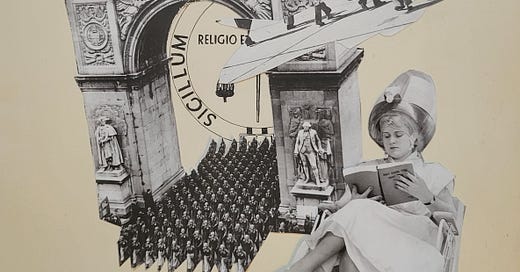E28. Lou Reed’s Nephew on Politics
It wasn’t that he knew less. He just knew different things. Lenin but not Wilde. Fanon but not Saki.
“There can be no final government,” Lou Reed’s Nephew said after an extended period of silence.
I said nothing for several seconds, perhaps a minute, before I realized he could only be talking to me.
“Who said there could be?” I asked.
“Who hasn’t?” he said, triumphantly, ready for a fight now that I’d joined it. “Socialists. Libertarians. Liberals,” he smirked at this third designation. “None of them provide expiration dates for the solutions they propose. They are all looking for our ‘forever home,’ as the animal rescuers say.”
“Where do you stand on animal rescue?” I asked. Lou Reed’s Nephew had a stance on everything and I was still trying to discern the pattern.
“Colonialism for dummies,” he said. “People rescue animals rather than people because animals never question if they need to be rescued in the first place. If three-legged cats ever learn to read Fanon that will be the end of that.”
“Like Saki’s talking cat.”
“You know I don’t drink,” he said.
I did know that—Camel Toe had been a success—but didn’t feel like explaining that Saki wasn’t a drink. He was an author we still read when I was in high school. He had had hands-on experience with grown-up colonialism, which is probably why we didn’t read him anymore. He had imagined a talking cat named Tobermory who had to be killed lest he spill everyone’s sordid secrets at an Edwardian dinner party. Lou Reed’s Nephew was almost twenty years younger than me, and it dawned on me how important these years were. (To me. They were my years. To him they were nothing.) It wasn’t that he knew less. He just knew different things. Lenin but not Wilde. Fanon but not Saki. I found it hard to predict what references he would miss and had no way of knowing what he knew that I didn’t, but there was something new every day.
“Paternalism with no fear of patricide,” Lou Reed’s Nephew continued. “One party rule with the gutters of revolt filled in with those inflatable bumpers they put up for children at the bowling alley. Animals can never become self-conscious and revolt against their human saviors.”
“Certainly not without a vanguard party,” I admitted.
“Exactly,” he said. “And there is another thing fueling this rampant zoophilia that no one wants to talk about.”
“And that is?”
“All pets are white,” he said.
“I don’t think so,” I said. “I’m sure I’ve seen them in various colors. Brown, red, black, sometimes a combination.”
“Not white,” he said. “White,” he annunciated so I could detect the capital “W.”
“Oh, you mean White.”
“Of course,” he said.
“I didn’t know you went in for Whiteness Studies,” I said. “Seems a little on the nose, if you know what I mean.” (I was not entirely sure what I meant, but I found that my banter became knowing and elliptical when dealing with Lou Reed’s Nephew, just to keep up.)
“Go in for? What could I possibly know more about?” he said, indicating his person with a magician-like flourish of his right hand. “It is the water in which I swim.”
“I see,” I said.
“And what I know about Whiteness, having been White my entire life, is that it is impossible that White people will ever be in the minority. Whiteness will never allow it.”
I braced myself, fearful that this young, logical White male had—as so often happens—chased young, White, male logic all the way to a morally despicable conclusion.
“What do you mean?” I asked, containing my terror.
“I mean that Whiteness will always find new White people.”
“Ah. I see. You mean the way the Irish and Italians were once considered less than White but have slowly become the very core of American Whiteness? You’re saying that this will be extended to new groups, Hispanics perhaps, or Asians—or some convenient combination thereof—such that a White majority is always maintained?”
“Yes,” he sighed. “Though it’s so boring when you say it. What I mean is that while new groups might at some point achieve Whiteness, pets already have. There is nothing Whiter than a pet. Even the pets of Black people are White, except for maybe stash house pit bulls with no vocal cords, but look what a radical improvisation it took to escape! White people would sooner call their Smart TVs and Roombas White than abandon Whiteness entirely.”
“You know what Gandhi said: ‘The greatness of a nation and its moral progress can be judged by the way its animals are treated.’”
“What a honky,” Lou Reed’s Nephew said.
“…”
“What were we talking about?”
“The final government.”
“Right,” he said. “Every advocate an aspiring tyrant. There can be no final government, because upon the establishment of such a government every thinking person in the world would know exactly what their next all-consuming project should be.”
“And what is that?” I asked, losing interest.
“Why overthrowing the final government, of course,” he said.




